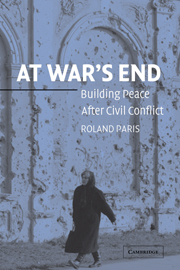Book contents
- Frontmatter
- Contents
- List of Figures
- Preface
- Introduction
- PART I FOUNDATIONS
- PART II THE PEACEBUILDING RECORD
- 3 Introduction to the Case Studies
- 4 Angola and Rwanda: The Perils of Political Liberalization
- 5 Cambodia and Liberia: Democracy Diverted
- 6 Bosnia and Croatia: Reinforcing Ethnic Divisions
- 7 Nicaragua, El Salvador, and Guatemala: Reproducing the Sources of Conflict
- 8 Namibia and Mozambique: Success Stories in Southern Africa?
- PART III PROBLEMS AND SOLUTIONS
- Conclusion
- Bibliography
- Index
5 - Cambodia and Liberia: Democracy Diverted
Published online by Cambridge University Press: 05 September 2012
- Frontmatter
- Contents
- List of Figures
- Preface
- Introduction
- PART I FOUNDATIONS
- PART II THE PEACEBUILDING RECORD
- 3 Introduction to the Case Studies
- 4 Angola and Rwanda: The Perils of Political Liberalization
- 5 Cambodia and Liberia: Democracy Diverted
- 6 Bosnia and Croatia: Reinforcing Ethnic Divisions
- 7 Nicaragua, El Salvador, and Guatemala: Reproducing the Sources of Conflict
- 8 Namibia and Mozambique: Success Stories in Southern Africa?
- PART III PROBLEMS AND SOLUTIONS
- Conclusion
- Bibliography
- Index
Summary
In contrast to Angola and Rwanda, where the democratization process might well have served as a catalyst for renewed conflict and the collapse of peacebuilding efforts, the results of postconflict democratization efforts in Cambodia and Liberia were widely viewed as positive. Both countries held largely free and fair elections under international supervision, and in both cases peacebuilding agencies declared their efforts a “success” and terminated their operations shortly after the elections. At first glance, then, Cambodia and Liberia seem to corroborate the Wilsonian hypothesis thatliberalization fosters peace in war-shattered states. Closer examination, however, raises serious doubts about the pacifying effects of democratization in these two cases. Even though both countries experienced a period of relative political stability following the departure of international peacebuilders, the adoption of democracy itself cannot be credited because the newly elected governments of both countries immediately backed away from their commitments to democracy and reverted to more autocratic forms of rule; and one country, Liberia, ultimately slipped back into war.
The Wilsonian hypothesis holds that violent conflict can be transformed into peaceful political competition when groups are allowed to pursue their interests freely through democratic political institutions. While this may help to explain the initial success of elections in Cambodia and Liberia, it does not explain the ensuing period, during which there was little real freedom to challenge the policies of governing cliques, and the behavior of both countries' elected leaders – Hun Sen in Cambodia and Charles Taylor in Liberia – was moredespotic than democratic.
- Type
- Chapter
- Information
- At War's EndBuilding Peace after Civil Conflict, pp. 79 - 96Publisher: Cambridge University PressPrint publication year: 2004



